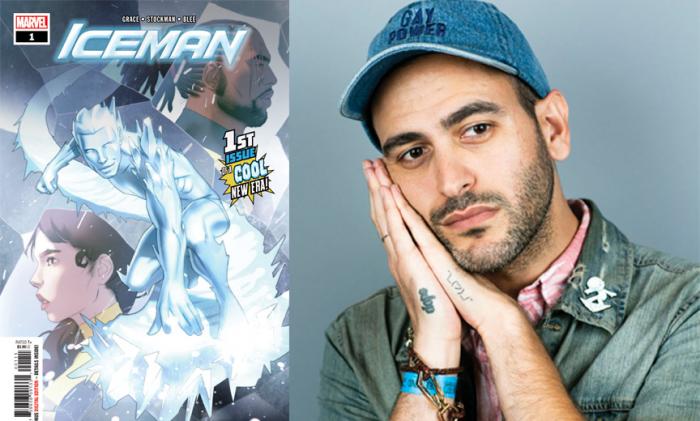Sina Grace Spills the Tea About Marvel's Handling of Gay Superheroes
FTC Statement: Reviewers are frequently provided by the publisher/production company with a copy of the material being reviewed.The opinions published are solely those of the respective reviewers and may not reflect the opinions of CriticalBlast.com or its management.
As an Amazon Associate, we earn from qualifying purchases. (This is a legal requirement, as apparently some sites advertise for Amazon for free. Yes, that's sarcasm.)

Sina Grace has been a focal point controversy within the comics community. Not for unprofessional behavior or for unethical crowdfunding efforts, as is de rigeur for the troublemakers these days. No, the attention on Grace has been solely because he is a gay man, writing a gay character, who just happens to be one of Marvel Comics' oldest mutants: Bobby Drake, Iceman.
During a story arc some years back, when a teenage version of the X-Men traveled to the future to meet their current adult timeline (I'm not getting into more detail than that; X-MEN titles have confused me for years now), telepath Jean Grey revealed to young Bobby Drake that he was gay. There's a fight now over whether he really was gay or if Jean messed with his mind, but that's a debate for another time. What matters is that the adult version of Bobby Drake is now gay, and is written that way. And because it looked good for Marvel, Iceman got his own series to highlight his new status quo, and was assigned to a gay writer to give the book legitimacy.
That writer was Sina Grace, and his version of Iceman was simultaneously celebrated and reviled. Usually not because Bobby was gay but because he acted like a jerk so frequently, which also went against decades of his established character.
Well, it turns out there may have been a good reason for Bobby's acerbic attitude. It may very well have been the feelings of the writer coming out in the product.
On the penultimate day of Pride Month 2019, the comics writer and artist took to his Tumblr account to share his feelings about his experience at Marvel. In his opening statements, Grace relates:
"With more corporations patting themselves on the back for profit-led partnerships wherein celebrities take selfies in rainbow apparel, and with buzz that Marvel Studios is preparing to debut their first gay character in the upcoming Eternals movie, there is an urgency to discuss the realities of creating queer pop culture in a hostile or ambivalent environment."
One can only surmise the 'hostile or ambivalent environment' to be Marvel Comics. And as Grace continues his entry, it becomes clear as crystal that this is the case. Grace states that any attempts at garnering publicity for the ICEMAN book, self-initiated, was met with mild rebuke at the House of Ideas, who instructed him to get all interviews 'pre-approved' by corporate before he could do them, which, if true, is far from the norm for any comics creator.
What Grace says Marvel should have done was to get behind the book with more faith.
They should have worked with a specialty PR firm, rather than repeat a tiresome cycle of treating the book like a square peg, and getting confused when it’s a hit.
Exactly how ICEMAN was a 'hit' isn't defined. In terms of trade paperbacks it sold well, in no small part to libraries stocking copies (which Sina admits), but as far as the monthly floppies went, they stacked up like cordwood in comics shops--and if comics shops can't sell one issue, they don't order the next one.
The last straw for Grace came when he created the drag queen mutant he called Shade, who later got renamed. Grace was stymied trying to promote the character, and ultimately walked away with, apparently, bitter recriminations.
Instead of feeling like I worked with some of the most inspiring and brave people in comics, I was surrounded by cowards.
Sina Grace's full statement can be found here: https://sinagrace.tumblr.com/


